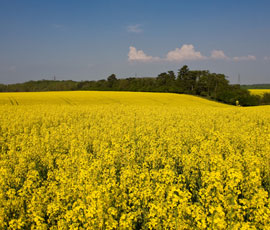Deduction threat for Scottish oilseed rape crops

Farmers in Scotland could face hefty price deductions on oilseed rape after finding unusually high levels of free fatty acids (FFA) in some samples.
United Oilseeds and Openfield have both found potentially high FFA contents in cargoes from Dundee, and are waiting for time-consuming laboratory tests to confirm whether levels exceed the contractual maximum of 2%. If so, end users could withhold a proportion of payment to cover extra costs involved in removing the FFAs to prevent a loss in food-grade oil quality.
The problem was compounding a bad year for Scottish growers, who had suffered poor yields and higher than expected growing costs, said Peter Loggie, combinable crops policy manager at NFU Scotland.
With FFA levels ranging from well below 2% to almost 10% in some samples, it was likely that all rapeseed loads would be tested at intake – a process that was expected to take 10-15 days. “During that period, it would appear that part of the payment or oil premium will be withheld and returned should the sample pass.”
“It’s normally a sign of rancid rapeseed, so it’s surprising to see high FFA levels off the combine. It is an early indication that there may be a problem – but equally there may not. We don’t want to cry wolf, but any claims that are levied will have to be passed on to the relevant farmers.”
John Thorpe, Openfield
Merchants were withholding roughly £30-£40/t pending sample results, and Mr Loggie urged them to ensure testing was completed quickly so payment could be made within the normal 28-day contractual window.
Owen Cligg, trading manager at United Oilseeds, said he hoped to get sample results from a bulk shipment soon. “I would expect fallbacks of 2-4% of the contract price where FFA contents are at 2-3%. But we’re still at an early stage, and there is a lot of work to do to establish what is in bulk stores.”
Tests were expensive, at £76 plus VAT – equivalent to about £2.50/t. “At the moment the merchant has to foot that bill – once we get the results we will know the level of problem we’re dealing with.”
John Thorpe, head of oilseeds at Openfield, said the problem had taken the industry by surprise. “It’s normally a sign of rancid rapeseed, so it’s surprising to see high FFA levels off the combine. It is an early indication that there may be a problem – but equally there may not. We don’t want to cry wolf, but any claims that are levied will have to be passed on to the relevant farmers.”
Wheat weights the lowest on record, says HGCA

